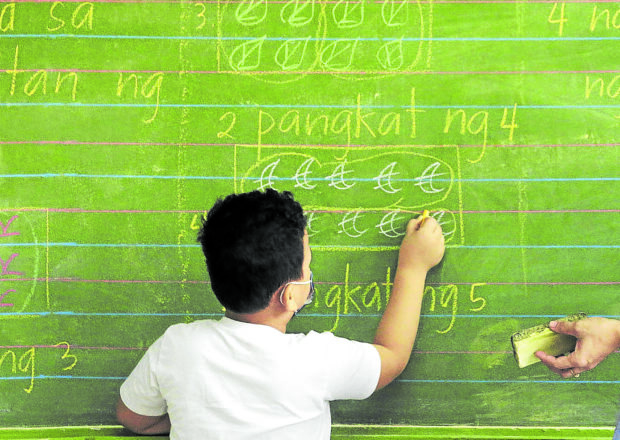‘Mass promotion’ hurts learning quality – PBEd
MANILA, Philippines — Basic education students are “not truly learning but merely progressing” through the school system, according to a report by the Philippine Business for Education (PBEd) which linked the “unofficial” policy of mass promotion to poor learning outcomes.
“Without a strong foundation in education, our workforce becomes less competitive on the global stage. It hinders innovation, productivity, and economic growth, limiting our potential for progress and prosperity,” PBEd executive director Justine Raagas said at Monday’s launching of the private sector-led advocacy group’s 2023 State of Education Report.
Its findings were based on consultations with over 300 stakeholders nationwide composed of teachers and school leaders (45 percent), government officials (24 percent), parents (14 percent), students (12 percent), and industry experts (4 percent).
According to Raagas, there is an apparent misunderstanding among participants about the concept of “No child left behind” which “led to the literal practice of passing students” or promoting them to the next grade level regardless of their competencies.
“Participants across all education sectors were in unanimous agreement that one of the underlying causes of poor student learning outcomes was the unspoken but common practice of automatic or mass promotion,” she said.
Raagas noted that despite the lack of an official and written policy from the Department of Education (DepEd), the practice has been “culturally and administratively ingrained” in the country’s education system, resulting in the erroneous association of learner outcomes with performance-based bonuses for teachers or a school’s standing in regional rankings.
Indirect pressure
In turn, this “flawed connection” puts “indirect pressure” on teachers to pass or promote their students to the next grade level.
“What normally happens is that there are efforts to kind of bridge the gap but what happens is that students are given extra work to comply with. Once this extra work is complied with, they are promoted to the next grade level … regardless of their grades and their competencies,” Raagas said.
She noted that the practice of mass promotion had been going on for a long time and even students themselves were aware that it was happening.
“In fact, there are many anecdotes from teachers of students blatantly disregarding their work or copying answers or worse, just easily giving up and saying, ‘It’s okay. I’m going to pass anyway,’” Raagas said.
She stressed that aside from resulting in a failure to master basic fundamentals such as reading, writing, and numeracy, mass promotion also caused unintended behavioral issues as students were lacking in fundamental values such as hard work, resiliency, teamwork, and respect.
DepEd Assistant Secretary Alma Ruby Torio, who was present at the event, said the department had no existing policy on mass promotion because it was following a “performance-based grading system” policy.
Based on the policy guidelines listed in DepEd Order No. 8, s. 2015, the passing grade for students in all learning areas should be 75.
For those in Grades 1 to 10 who “do not meet expectations” in two learning areas, they will be required to take remedial classes which they must pass to move on to the next grade level. On the other hand, those who fail to meet expectations in three or more learning areas will be retained in the same grade level.
Learning camps
“However, teachers should ensure that learners receive remediation when they earn raw scores which are consistently below expectations in written work and performance tasks by the fifth week of any quarter. This will prevent a student from failing in any learning area at the end of the year,” the DepEd order said.
“We don’t want to label our learners who will be taking back subjects [as flunkers]. What we’re coming up with this July, a month before our opening, is the organization of learning camps. The learning camps will cater to our learners who will do enrichment activities, remedial and intervention activities,” Torio said.
For education expert Therese Bustos of the University of the Philippines, retaining or failing children without providing them the necessary support was no guarantee that they would be able to master the competencies needed for the next grade level.
“So we need to think of solutions … because you will have a bloated grade level with so many children who have not mastered the competencies. We need to think of other measures other than retaining them in a particular grade level,” she said.
Raagas, meanwhile, said that finding appropriate interventions was being impeded by the lack of proper assessments, preventing accurate evaluation of student performance.
“Participants pointed out that localized assessment of learning loss was a major concern and a necessary precedent to the contextualization of remedial questions [for] students,” she said.
The PBEd report stressed the importance of implementing effective evaluation mechanisms promoting merit-based progression, ensuring that students acquire the necessary competencies to move to the next grade level and ultimately find employment.
“Timely evaluation of a student’s performance is necessary for learning and improvement as it will give both teacher and learner a way to catch up without automatically retaining or failing students,” Raagas said.
But Chito Salazar, PBEd president, batted for an independent assessment agency because “right now the assessment of DepEd results is being conducted by DepEd itself.”
While the issue of mass promotion was discussed at the Second Congressional Commission on Education, Salazar said it remained unaddressed since technically, there was no document or official policy on the matter.
“One of the key suggestions is to set up an independent agency on learning assessment because the problem is … there is no counter-check on teachers’ self-evaluation of their students’ capacity to move on to the next level,” he added.
